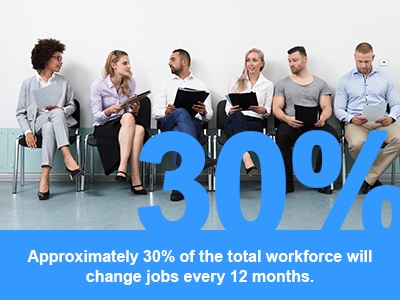 In today’s challenging job market, many organizations are trying innovative ways to fill their jobs. Companies are implementing referral programs and trying new software to improve their hiring practices. We’ve all heard that hiring non-traditional candidates is a proven way to hire more quickly and maintain happy employees. But, have you considered career changers? Career changers are among a growing workforce population. These are individuals who have evaluated their skills, studied the market, and in some cases obtained a new degree to land a professional role within a new industry.
In today’s challenging job market, many organizations are trying innovative ways to fill their jobs. Companies are implementing referral programs and trying new software to improve their hiring practices. We’ve all heard that hiring non-traditional candidates is a proven way to hire more quickly and maintain happy employees. But, have you considered career changers? Career changers are among a growing workforce population. These are individuals who have evaluated their skills, studied the market, and in some cases obtained a new degree to land a professional role within a new industry. 
Changing careers is popular these days. Studies show that the average person will change careers 5-7 times during their working life. Approximately 30% of the total workforce will now change jobs every 12 months according to career change statistics. Gone are the days of holding one job in a professional lifetime. Today’s workforce is less likely to stick to the same job—or even the same career or industry—for several consecutive years.
Like non-traditional candidates, career changers are eager to learn and will likely consider entry-level or lower wages in exchange for experience and mentorship. However, like job hopping, hiring managers tend to be hesitant at considering career changers. It can be tough for hiring managers to see past the lack of specific industry or career experience. Here are few reasons why companies should consider career changers:
- They are willing to take risks and think creatively – outside the box.
- They bring a wealth of skills from their previous career – at all levels.
- They are flexible and willing to learn from any experience – they will do the work.
Despite the reasons to consider career changers, the concerns and reservations hiring managers have regarding these candidates are legitimate and should be addressed. In some facets, it could take slightly longer to train a career changer; however, they are invested in the change and will work to quickly become a contributor to your organization. Career changers should understand the obstacles and do their homework to overcome them. These individuals should:
- Understand enough about the job and industry that they can confidently succeed in an interview.
- Recognize the specific skills and capabilities that the new industry requires and outline these areas in their resume.
- Prepare for an interview opportunity by identifying the questions hiring managers will need answered.
What should hiring managers consider before hiring career changers?
- Does this candidate have 70% of the skills needed for the job?
- Does this candidate have the right transferable skills?
- Does this candidate understand the industry and its challenges?
- Does this candidate have the motivation necessary to succeed?
- Does this candidate have a long-term commitment to this career and industry?
Employers should keep an open mind when it comes to considering transferable skills. These skills can be surprisingly valuable. If a sales professional applies to a non-sales related position, consider this applicant’s people skills, management skills, decision making skills, endurance, and ability to work well under pressure. Candidates from different careers and experiences can bring value and new ideas to a workplace.
Additional ASE Resources
Assessments – ASE is a resource for employment tests that can help identify transferable skills. If your organization is considering testing candidates for employment or promotion, ASE provides testing tools, information, and consultation. For more information, please contact Michael Burns.
Sources: insightresources.seek.com, themuse.com